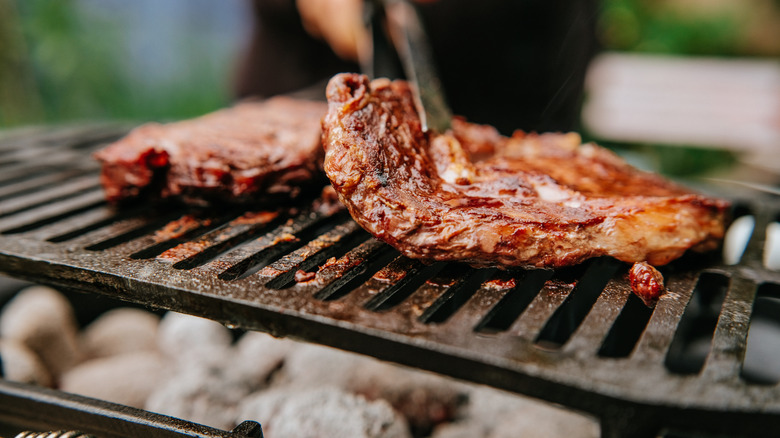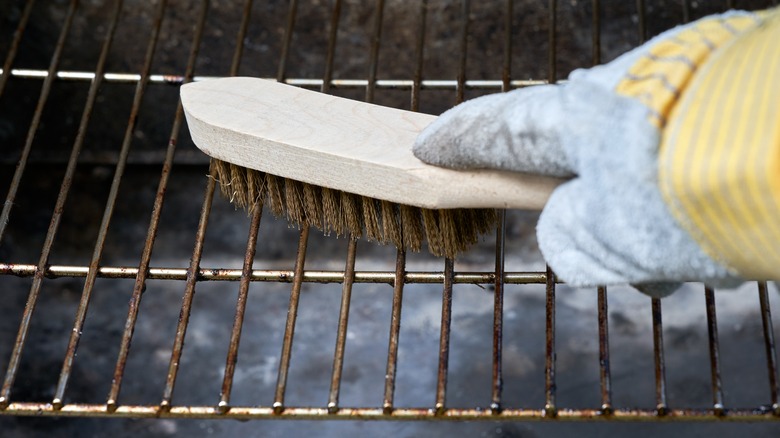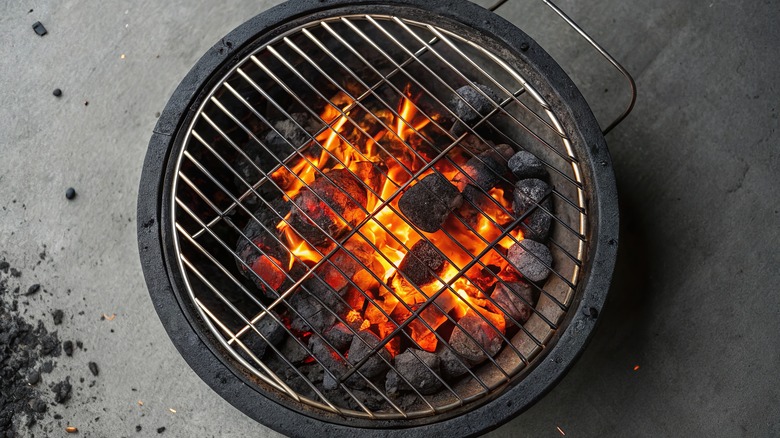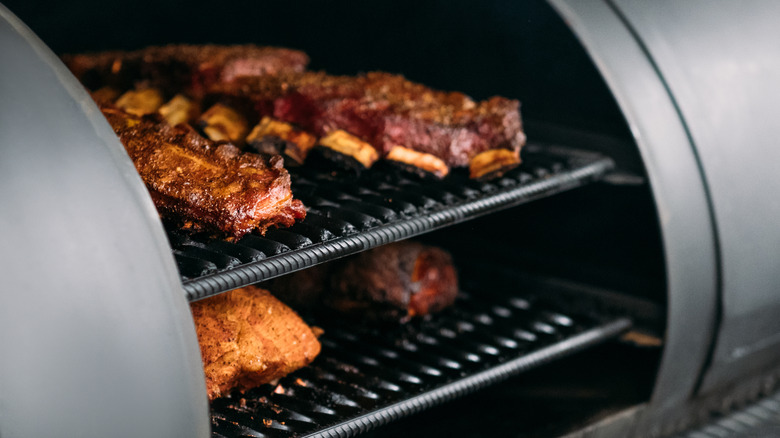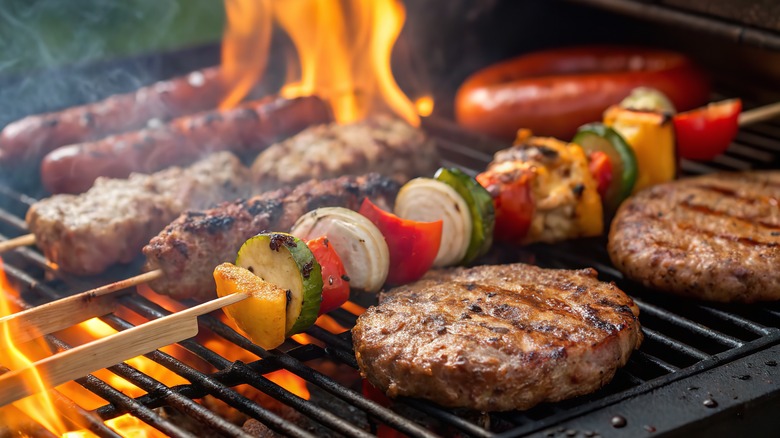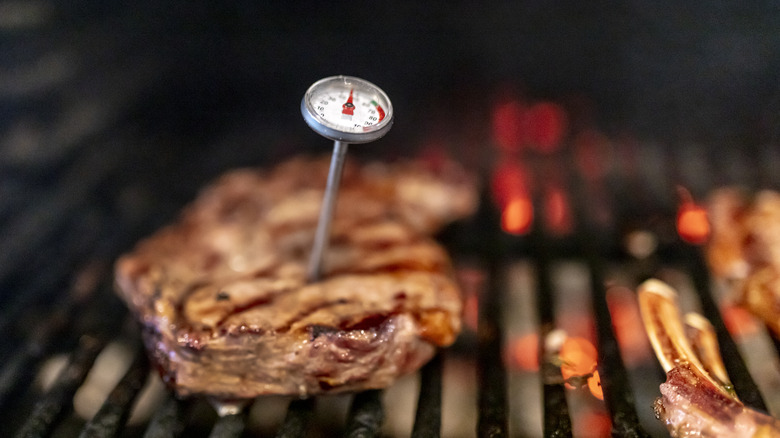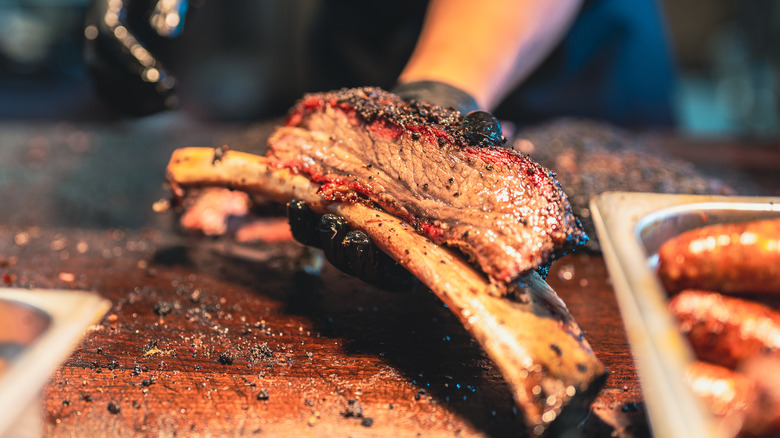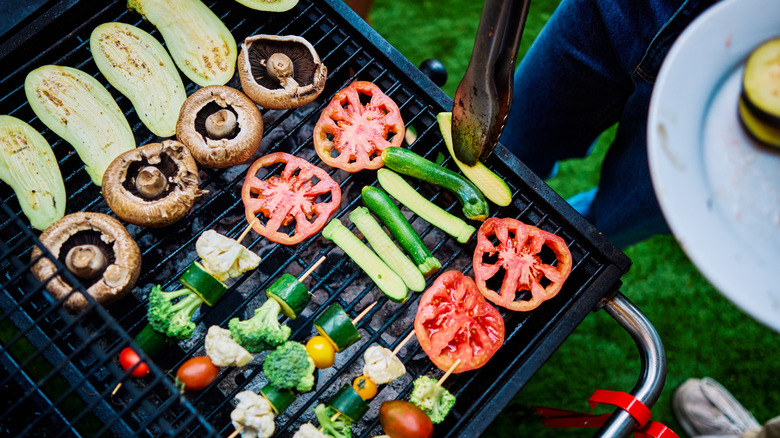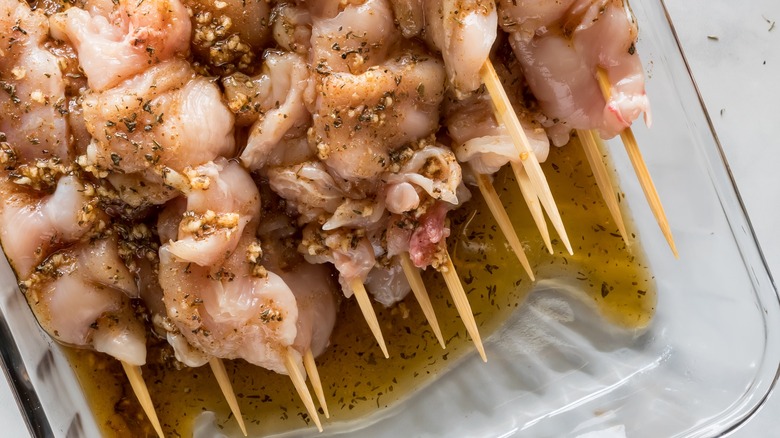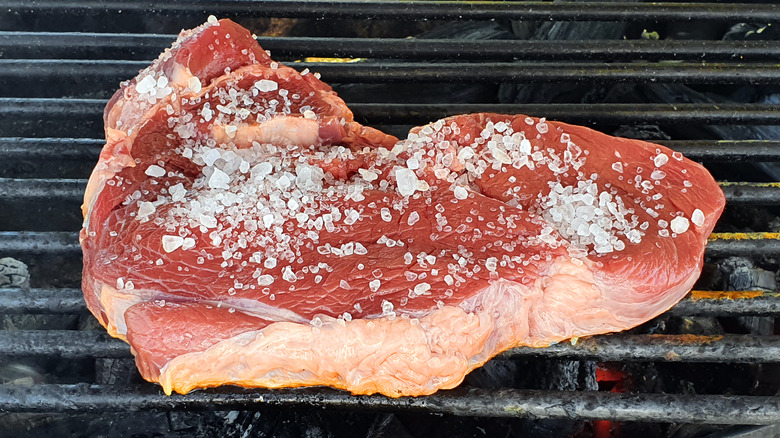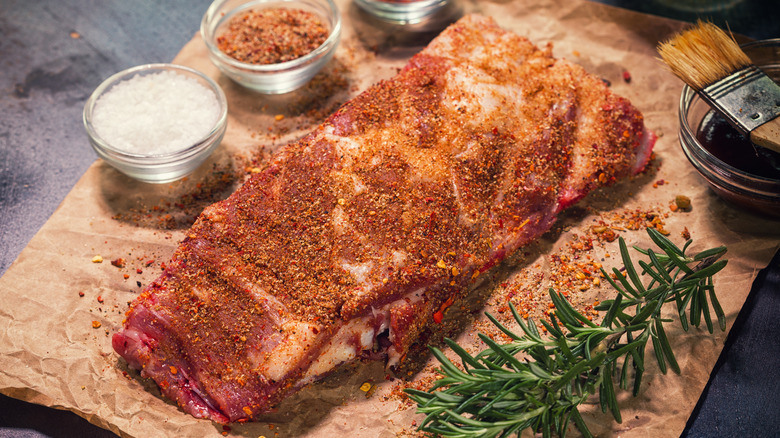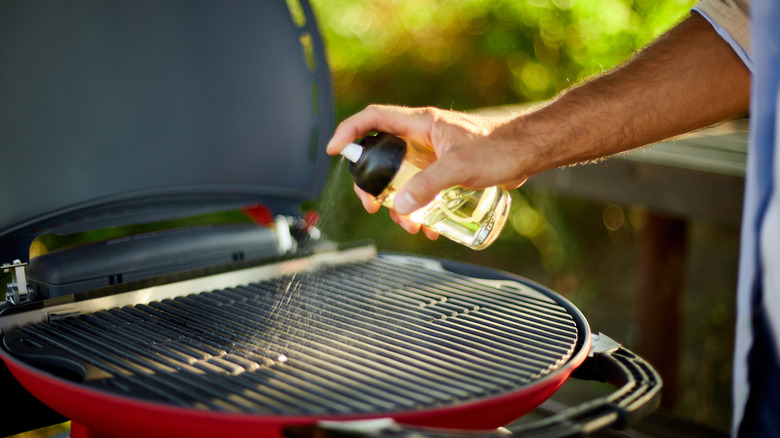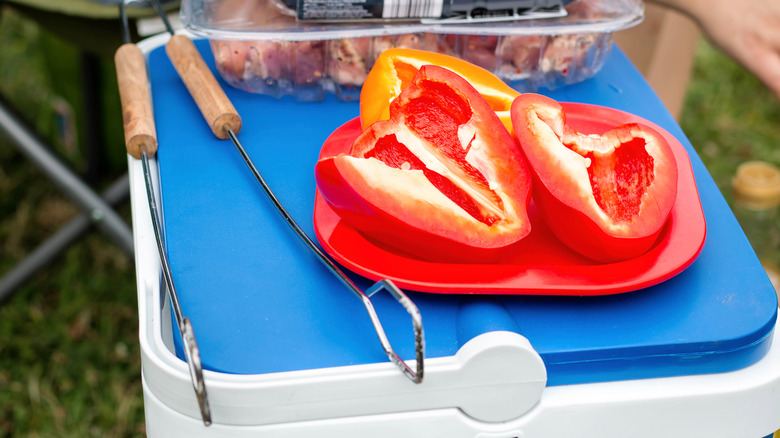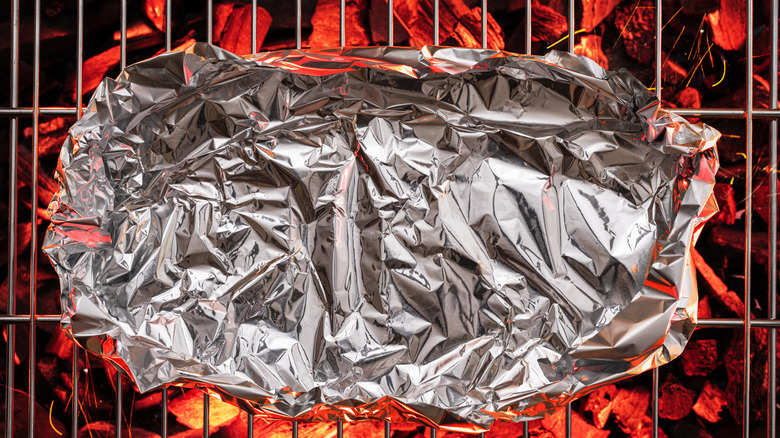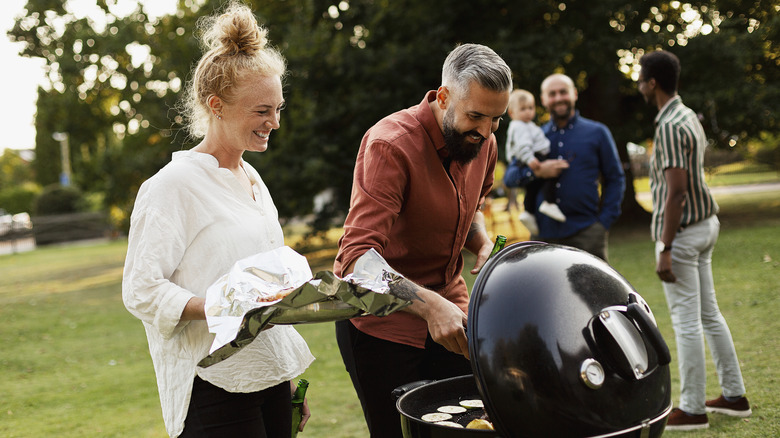14 Expert Tips For Better Barbecue
We may receive a commission on purchases made from links.
In some countries, having a barbecue means being served meat that's burned outside, raw in the middle, and stomach bugs with no extra charge. In the United States, it is an art form. While some states have a grilling "season" that's dependent on the weather, and others hold cookouts and tailgates any time of the year, they all have the same thing in common: Everyone is there for the food.
Of course, that includes salads and sides, but what goes on the grill is the star of the show, whether that's meat, fish, or vegetables. Getting delicious results every time, especially for those new to the BBQ scene, can be tricky.
How often should you clean your barbecue or grill? What's the best equipment to have, and how can you tell if everything is cooking as it should? We turned to chefs Steven Satterfield, Dylan Clay of Barbecue FAQ, Michael Conlon, pit boss at Virgil's Real BBQ, Sam Jones, owner of Sam Jones BBQ restaurants, and The Grillin' Fools' Scott Thomas, for their expert tips for a better barbecue.
Clean and season your grill before you use it
There is a school of thought that leaving any old bits of charred food or grease on a barbecue will help the flavor. But ask yourself this: Would you do the same with a pan? Of course not, and rightly so. Using a dirty barbecue not only increases the risk of bacteria and mold developing — two items you don't want on the menu. Plus, accumulated dirt and grease can affect its performance and the flavor of your food.
Steven Satterfield recommended preheating your grill to burn off any lingering bits of food or grease. Rub it either with release spray or coat a cloth with a little oil or fat, and use them to clean the grates. If there's any stubborn residue, go at it with a grill brush.
Next, it's time to season your barbecue. Lard or tallow are both good for Michael Conlon, but you can also use a quality canola-based spray. Apply the fats or oil after getting the grill to a high heat and spraying it with water, which should turn to steam on contact. Leave it for around two hours and you'll be good to go.
Avoid too much ash in charcoal grills
Barbecuing as a cooking process is hundreds of years old with a rich, culturally diverse background. Technology has made it quicker and cleaner, but slow-cooking over wood enjoyed a revival in the 1980s. It's now a go-to for millions of households, but there are a couple of mistakes to avoid, according to Scott Thomas.
"For charcoal grills, too much ash can kill the cook," he said. The tenderest and juiciest meat is cooked over several hours. However, if there's lots of ash sitting in the bottom of the grill, adding more could dampen or even snuff out the fire. "If the target temperature of say a brisket is 203 F, and the grill can only get to 180 F, we've got a problem," said Thomas. His answer? Scoop out the ash regularly.
He also had advice for newcomers and smoke: Less is more. "The goal is for a thin blue smoke trickling out of the grill," Thomas said. Only one small chunk of smoke wood should be smoking at any time, and you should only add another when it stops smoking.
Create a heat sink in your smoker
Charcoal grills are great for infusing barbecued food with lots of flavor, thanks to the volatile organic compounds in burnt wood – better known as smoke. The longer you smoke meat, the more profound the taste, but it's not the only way you can cook with a smoker.
Water pans can deflect heat and bring humidity to the smoker, but Dylan Clay uses his to create a heat sink. He uses the minion method to heat the charcoal — using one lit piece to slowly ignite the rest to have a more consistent burn over a longer period, ideal for low and slow cooking.
After lighting a quarter chimney of charcoal and putting it to one side, Clay leaves the lid off for [around] 10 minutes to let the fire build. "During this time the water pan will start to come to a boil and function as a heat sink to keep the temperature down. The goal being 225F to 275 F in the smoker. You'd then add your food to the cool zone, add a chunk of your favorite hardwood and smoke it."
Don't be afraid of direct heat
Talk to anyone who barbecues regularly and you'll quickly find out whether they are firmly Team Grill or Team Smoke. But there's a third group who use the flames to cook their food, also known as direct heat. Steven Satterfield is one, "Always grill some veggies while the fire is burning," he enthused. Dylan Clay is another.
He thinks it's something that anyone who is interested in BBQ should give it a try. "I've grilled, smoked, even dehydrated meat for 17+ years and I think that direct heat BBQ tastes superior in just about every way," Clay said. "[The] skin is crunchier because we're rendering more of the skin fat and collagen. The meat takes on awesome flavor from the meat drippings which land on the hot coals which vaporizes."
The Barbecue FAQ founder added that regularly mopping the meat allows you to keep a close eye on it and introduce more flavor through fresh ingredients, vinegars, or sugars. Using direct heat can also help reduce the amount of charcoal you use but, for Clay, the main reason is it makes the food taste better.
Invest in a good probe thermometer
If you're new to the world of BBQ, it's easy to be blindsided by the vast array of kit that is available. While some are obvious, such as a good wire grill brush, spatulas, and long, strong tongs, others can be surplus to requirements. Steven Satterfield, for example, does not recommend buying lighter fluid, because it will affect the taste of the food. But investing in a good probe thermometer is a must.
Even the most experienced cooks can make mistakes when checking meat for doneness. The outside may look perfect, but the interior could be a long way from edible, and potentially leave you and guests falling ill thanks to a food safety slip-up. A meat or probe thermometer can give you a more accurate idea of how your cook is progressing.
For Scott Thomas, it's a vital piece of equipment. "My BBQ game got many levels better once I got one," he said. He owns several ThermoWorks' Thermapens, keeping one in his travel kit, and others next to the stove and grills. If your budget can't quite stretch to that many, this one from ThermoPro will do the job.
Hot hold your meat
Being invited to a cookout, barbecue or tailgate is great. Hosting one is a totally different matter, especially if you're inexperienced. Constantly wondering if the meat you've been obseessing over for hours will be tender and juicy, and not under or overcooked can be extremely stressful. Luckily, our experts have a trick or two up their sleeves.
Dylan Clay suggested everyone should smoke their meat a day in advance and then "hot hold" overnight. BBQ restaurants do it, and it eliminates any concerns about cooking your meat on the day of the get-together. Clay uses his electric smoker to hot hold, but a kitchen oven or even a toaster oven will do the same job. "The goal is just to keep the meat above 140 F for food safety," he said.
Scott Thomas has another handy tip for those with cash to spare: Use a Cambro. It's a box that caterers and restaurants use to keep food warm for long periods of time. "The heavy-duty plastic ones are a few hundred dollars. The cheaper foam ones are a couple hundred," he said.
Get the best out of BBQ vegetables
A few decades ago, grilling or barbecuing vegetables would have been near-unthinkable but times — and tastes — have changed. A new world of flavors is open to everyone, not just vegetarians and vegans. Steven Satterfield has lots of tips for anyone who wants to try.
If you're dry grilling, there are myriad veggie choices. Satterfield recommends using scallions, summer squash or zucchini, green beans, peppers, hardy greens, cabbage wedges, and onion planks. "When cooking veggies with oil, I go for eggplant, tomato, fall squash, root veggies, peaches, and other fruits," he said, adding the method stops the cut surface from sticking and flesh from tearing.
If you need sauce inspiration for your barbecued veggies, the chef has plenty of suggestions, including chimichurri, romesco, chermoula, harissa, and green goddess, as well as mayo, aioli or yogurt with flavors added. While vegetable specialist Satterfield's go-to BBQ recipe is grilled cabbage, Scott Thomas' is surprising: it's his own side dish of smoked baked beans. The Grillin'Fools owner described it as "positively addictive," and a must-have addition to his annual Memorial weekend heirloom hog roast.
Brine chicken for extra juice and flavor
Millions of people across the United States spend hours carefully brining their turkeys at Thanksgiving, creating delicious concoctions and sitting their meat in them for hours to maximize flavor. According to our experts, there's no reason why barbecue fans shouldn't do the same. Sam Jones said the BBQ chickens sold at his restaurant are brined overnight.
"Brining helps give it some forgiveness in the cooking process," he said, adding the extra liquid creates a "buffer so you are not as likely to overcook it," resulting in tender and juicy chicken. For Dylan Clay, it depends on what kind of chicken he's planning to barbecue. "Pretty much all my boneless skinless chicken breast is brined before grilling," he admitted, saying it improved the texture and the meat was always juicier. Like Jones, Clay agreed brining helped prevent overcooking and ensured the meat was more evenly salted.
For chicken with skin, he suggested a different approach: dry brine. "Wet brining makes the skin soggy and it doesn't crisp up as well," he said. His herbs of choice include dried herbs like rosemary or thyme, a little sugar, and paprika for color. "I then use a binder that has an oil to help with browning, this could be EVOO or even mayo."
Use salt to tenderize the meat
Salt plays such an important role in cooking, and not just the art of barbecuing. It enhances flavor, but also brings balance and cohesion to different ingredients, elevating even simple dishes from "meh" to "mmm." For our BBQ experts, it's an unmissable component.
"Always season. Salt to begin with no matter the protein," urged Scott Thomas. He sticks to salt, pepper, and garlic for beef because, as far as he's concerned, "that's all it needs." Clearly, he's never tried this powerhouse rub. Thomas added salt also tenderizes the meat, and if it's in a brine with aromatics or other ingredients, so much the better, as it will get all those flavors too. "Win, win, and win," he said.
But how much salt is too much? One person's idea of perfect seasoning is another's inedible. For Dylan Clay, it is a minefield of underestimation, "In a lot of cases people think they're using an adequate amount of salt for their steaks, chops, etc. But they're not." Adding to the challenge is the fact not all salt is the same, and it pays to know a bit more about the type you want to use. For example, Clay pointed out that Morton's salt has double the density of Kosher Diamond Crystal.
Be generous with seasoning
One of the most common pitfalls when making fried chicken is not seasoning at every stage, and it's a similar story with barbecued meat. Pork, chicken, beef and even relative newcomer Jewish barbecue, can all benefit from the holy trinity of salt, pepper, and garlic, but there is plenty of room to be more adventurous with your seasoning.
Scott Thomas reaches for paprika-based BBQ seasoning for pork, but prefers island or Caribbean-inspired flavors for seafood. Whatever you choose, he is insistent about one thing: Don't be afraid to load on your seasonings. That's because during the cooking process, anywhere between 30% and 70% of them will be lost. "I'm also a big believer in a light dusting of seasoning a couple times throughout the cooking process. I almost always re-apply at least once," Thomas said.
That said, he's not among those who rave over BBQ sauce. He doesn't rank it as an essential ingredient. "In fact, I rarely apply it," he admitted, adding: "BBQ sauce can overpower the dish. But sometimes I crave it, so I put it on the side. To me, simply seasoned meat means the meat is the star."
Quality oil on your grill is essential
Barbecuing food is all about paying attention. Choosing the right cut of meat or vegetables, getting the seasoning right, and making sure they're cooked to perfection takes a lot of effort — but the end results are worth it. But when the cookout is over, the work isn't done.
If you barbecue with a grill, you need to clean it so it's ready for storage, and that, too, needs a little time and care. You can clean some parts of it when it's hot, while others have to be completely cool, but for Michael Conlon, there's one important factor to remember at this stage: Use a quality oil.
Keeping your barbecue clean and the grill plates lubricated might be a chore, but putting the work in here will pay off. Choosing a good oil to season your barbecue before you next use it pretty much guarantees successful grilling next time around. "It doesn't matter what you're cooking — if you start with high-quality proteins, it will only be that much better in the end," Conlon said.
Use a cooler to rest your meat
The act of cooking meat contracts the muscle fibers so they cling onto any moisture. Resting meat for several minutes after it comes out of the oven allows those fibers to relax and the juices to flood the meat. Just as with a roast turkey, it's important to rest barbecued food to get the same juicy, tender results.
Steven Satterfield recommends resting any barbecued vegetables at room temperature and in single layers, as stacking will trap any heat. For those cooking meat, a simple piece of kit can be invaluable: a quality cooler. Michael Conlon and Scott Thomas urged home cooks to use one to rest their meat. Both suggest wrapping cooked meat in a towel and popping in the cooler, where Conlon leaves his for several hours.
Thomas admitted, "I once kept the Thanksgiving turkey warm for three hours wrapped in foil and a towel in a cooler. It was one of the best turkeys I've ever grilled. And when I peeled that foil back, the steam nearly melted my face off, well, almost."
Foil is your best friend
There's a lot of expensive technology associated with barbecuing, from high-tech electric grills and hot boxes, to any number of stylish accessories. But, according to Scott Thomas, one of the best things to have on hand while barbecuing, especially if you're a novice, is a roll of tin foil.
"Foil is your friend," he said. Long ago, people with low incomes used the long, slow BBQ process to turn cheap, tough cuts of meat into tender, juicy deliciousness. Well, aluminum foil helps accelerate the process. "Smoke that pork shoulder for two to three hours, then wrap in foil and that nine-hour cook session just might be done in six," Thomas advised.
The foil works to speed up the breakdown of the connective tissues that make the meat tough, but it's not the only benefit to barbecuers. Line your grill with it and watch it catch dripping fat, making the clean-up faster. It can also shield delicate foods from direct heat, preventing them from overcooking or drying out, and wrapping them in foil makes adding smaller ingredients, like fish or vegetables, easier.
Take your time
Any gathering takes organization, particularly when food is involved: There won't be many people who fire up their BBQ on a whim. A successful barbecue requires planning and that means taking the time to do every stage well. "Don't be in a big hurry. One of the most common mistakes is people not allowing themselves enough time," said Sam Jones.
If the weather's a factor where you live, keep an eye on the forecasts. Properly clean and oil your barbecue, then get your meat, fish and vegetables brined, seasoned and prepared in advance to maximize flavor. Make sure you have plenty of tin foil to hand, as well as access to the oven or a cooler so everyone's food stays piping hot. You can even use this hack to fix your sides.
Above all, when it comes to the actual barbecuing, take your time. Like Jones said, "You can rush cooking a hamburger. You can't rush cooking ribs. Or like when people cook chicken, people think you got to flip a chicken like hamburgers. When we cook chickens, we turn 'em one time."
